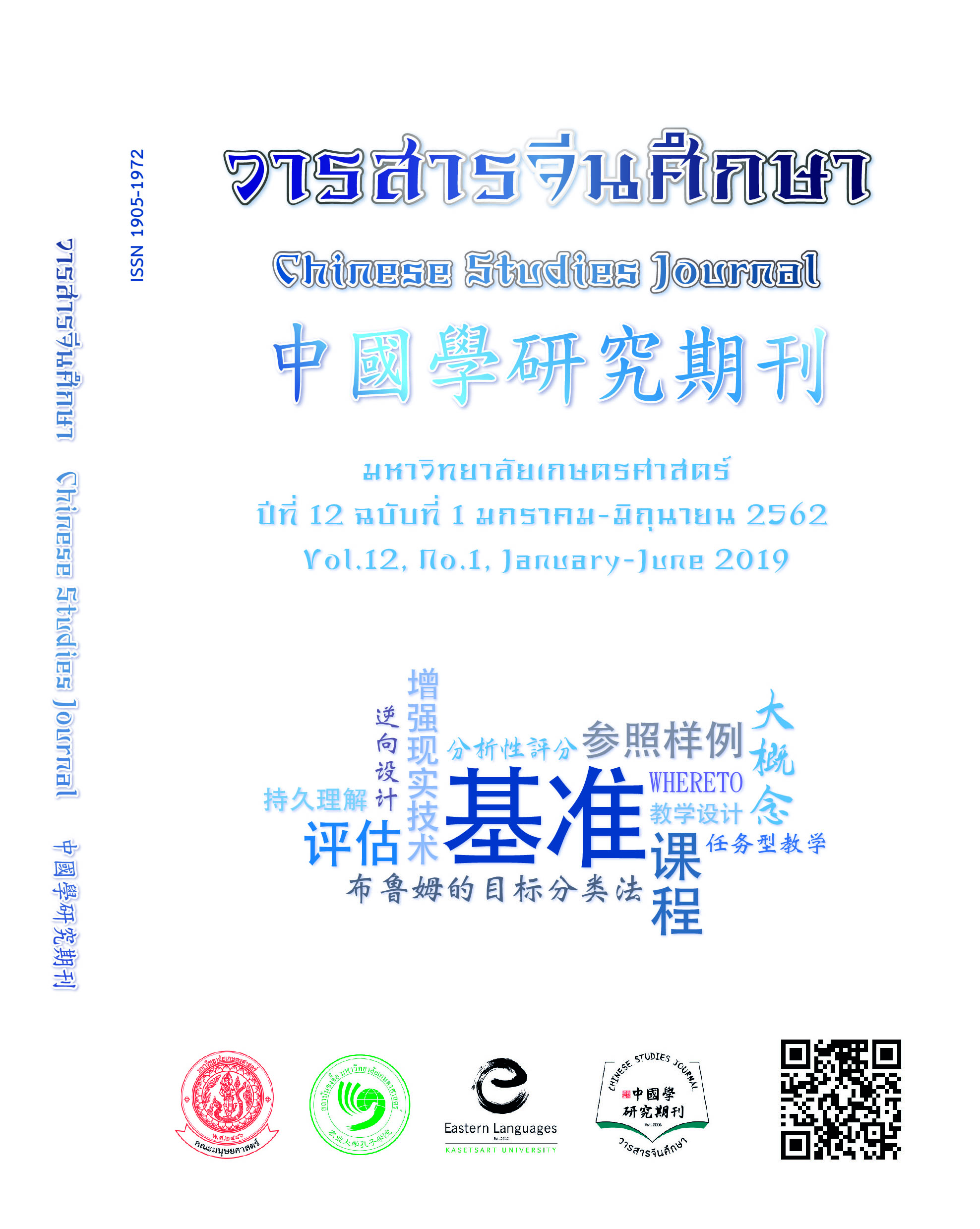A Study on the Acquisition of Chinese Existential Sentences in Students of Rangsit University in Thailand
Main Article Content
Abstract
Existential sentences are a very distinctive type of sentence in Chinese. They have a very unique syntactic format. The academic community has long been concerned with the syntactic, semantic and pragmatic features of the existing sentences, and there appeared few research results of the acquisition of surviving sentences of Thai native speakers. We took the second and third years undergraduate students of the Chinese Department of Rangsit University in Thailand as the research sample group, and designed three tests to test the situation of learning existential sentences, took the situation of Chinese native speakers to learn the existing sentences as a comparison. It is found that students' overall acquisition is poor, and they are seriously influenced by the mother tongue. The unmarked verbs and structures are easy to learn, and the verbs or structures with higher degree of markup need a further study to get better results for Thai native speakers.
Article Details
ผลงานทางวิชาการที่ลงตีพิมพ์ในวารสารจีนศึกษา มหาวิทยาลัยเกษตรศาสตร์ เป็นลิขสิทธิ์ของผู้เขียนหรือผู้แปลผลงานนั้น หากนำลงในวารสารจีนศึกษาเป็นครั้งแรก เจ้าของผลงานสามารถนำไปตีพิมพ์ซ้ำในวารสารหรือหนังสืออื่นได้โดยมิต้องแจ้งให้ทราบล่วงหน้า แต่หากผลงานที่ได้รับพิจารณานำลงในวารสารจีนศึกษา เป็นผลงานที่เคยตีพิมพ์ที่อื่นมาก่อนเจ้าของผลงานต้องจัดการเรื่องปัญหาลิขสิทธิ์กับแหล่งพิมพ์แรกเอง หากเกิดปัญหาทางกฎหมาย ถือว่าไม่อยู่ในความรับผิดชอบของวารสารจีนศึกษา มหาวิทยาลัยเกษตรศาสตร์ ทั้งนี้ ความคิดเห็นต่างๆ ในบทความเป็นความคิดเห็นส่วนตัวของผู้เขียน ไม่เกี่ยวกับกองบรรณาธิการวารสารจีนศึกษา มหาวิทยาลัยเกษตรศาสตร์
References
黄南松.(1996). 论存在句.《汉语学习》, (4).
金 岩.(1997).汉语存现宾语在朝鲜语中的对应形式.《汉语学习》,(5).
雷 涛.(1993).存在句的范围、构成和分类.《中国语文》,(4)a.
雷 涛.(1993) 存在句研究纵横谈.《汉语学习》(2)b.
聂文龙.(1989) 存在和存在句的分类.《中国语文》,(2).
潘 文.(2003)《现代汉语存现句研究》.复旦大学博士学位论文.
宋玉柱.(1982) 略谈假存在句.《天津师大学报》,(6).
宋玉柱.(1991) 经历存在句. 《汉语学习》,(5).
温晓虹.(1995).主题突出与汉语存现句的习得.《世界汉语教学》,(2) .
杨素英.(1999).从非宾格动词现象看语义与句法结构之间的关系.
《当代语言学》,(1).
杨素英.(2007).汉语作为第二语言存现句习得研究.《汉语学习》,(1).
Bloom , L. (1970). Language Development : Form and Function in Emerging
Gramma rs. CAmbridge ,MA : MIT Press.
Eve V. Clark. (-).Locationals : Existential , Locative , and Possessive
Constructions. in J . H. Greenberg(ed. ) , Universals of Human Language (Vol. 4).
Stanford , CA : Stanford University Press.
Duff , Pat ricia A. (1993). The Convergence of Possessive and Existential
Constructions , Syntax ,Semantics , And SLA. SSLA ,1993 , (15) :1 - 34.
Hendriks , Henri ëtte. (2000). The acquisition of topic marking in L1 Chinese
and L1 and L2 French. St udies on Second Language Acquisition,
(22) :369 - 397.
Huang , C2T. James. (1987). Existential sentence in Chinese and (in)
definiteness. In E. Reulang and A. ter Meulen (eds. ) The rep resent ation
of ( in) definiteness. Cambridge and London : The MIT Press.
Klein , W. & Perdue , C. (1997). The basic variety (or : Couldn’t natural
languages be much simpler ?). Second Language Research, (13) :
301 - 347.
Li , Charles N. & Thompson, Sandra A. (1981). Mandarin Chinese-A Functional
Reference Grammar. Berkeley:University of California Press.
Pan, Haihua. (1996). Imperfective aspect zhe , agent deletion , and locative
inversion in Mandarin Chinese. Natural Language and Linguistic Theory,
(14) :409 - 432.
Perdue, C. (ed. ). (1993). Adult Language Acquisition : Cross-Li nguistic
Perspectives. New York : Cambridge University Press.
Perlmutter, David M. (1978). Impersonal passives and unaccusative hypothesis.
Berkeley Linguistic Society, (4) :157 - 189.
Sasaki. Miyuki. (1990). Topic prominence in J apanese EFL student s’existential
constructions. La- nguage Learning, (40) :337 - 368.
Shou-Hsin Teng. (1975). Negation in Chinese. Journal of Chinese
Linguistics ,1975 , (2) :125 - 140.
Volpe, Mark. (2001). The causative alternation and Japanese unaccusatives.
Snippets ,4 ( http :/ / www. ledon2line/ snippet s/ ),14 - 15.
Yang, Suying & Pan, Haihua. (2001). A constructional analysis of the existential
structure. In Pan , Haihua (ed. )Studies in Chinese linguistics II.
Hong Kong : Linguistic society of Hong Kong, 189 - 208.


